Pratikshya Lamsal - Contemporary Indigenous Health Reflection Report
VerifiedAdded on 2022/10/19
|7
|1889
|2
Report
AI Summary
This assignment is a guided reflection by a student, Pratikshya Lamsal, on their evolving understanding of Aboriginal and Torres Strait Islander health and wellbeing, using the Gibbs reflection framework. The reflection analyzes how the student's initial biases and perceptions, as revealed in a previous assessment, have transformed through engagement with course materials, including case studies, lectures, and discussions. The student highlights the importance of cultural competency, and the need to incorporate cultural sensitivity into clinical skills. The reflection also emphasizes the impact of learning activities such as case scenario analysis, lectures with rich media resources, and class discussions. The student acknowledges the significance of cultural awareness and professional development in improving healthcare outcomes for Indigenous communities. The student plans to use the insights gained to enhance future healthcare practice and address health disparities.
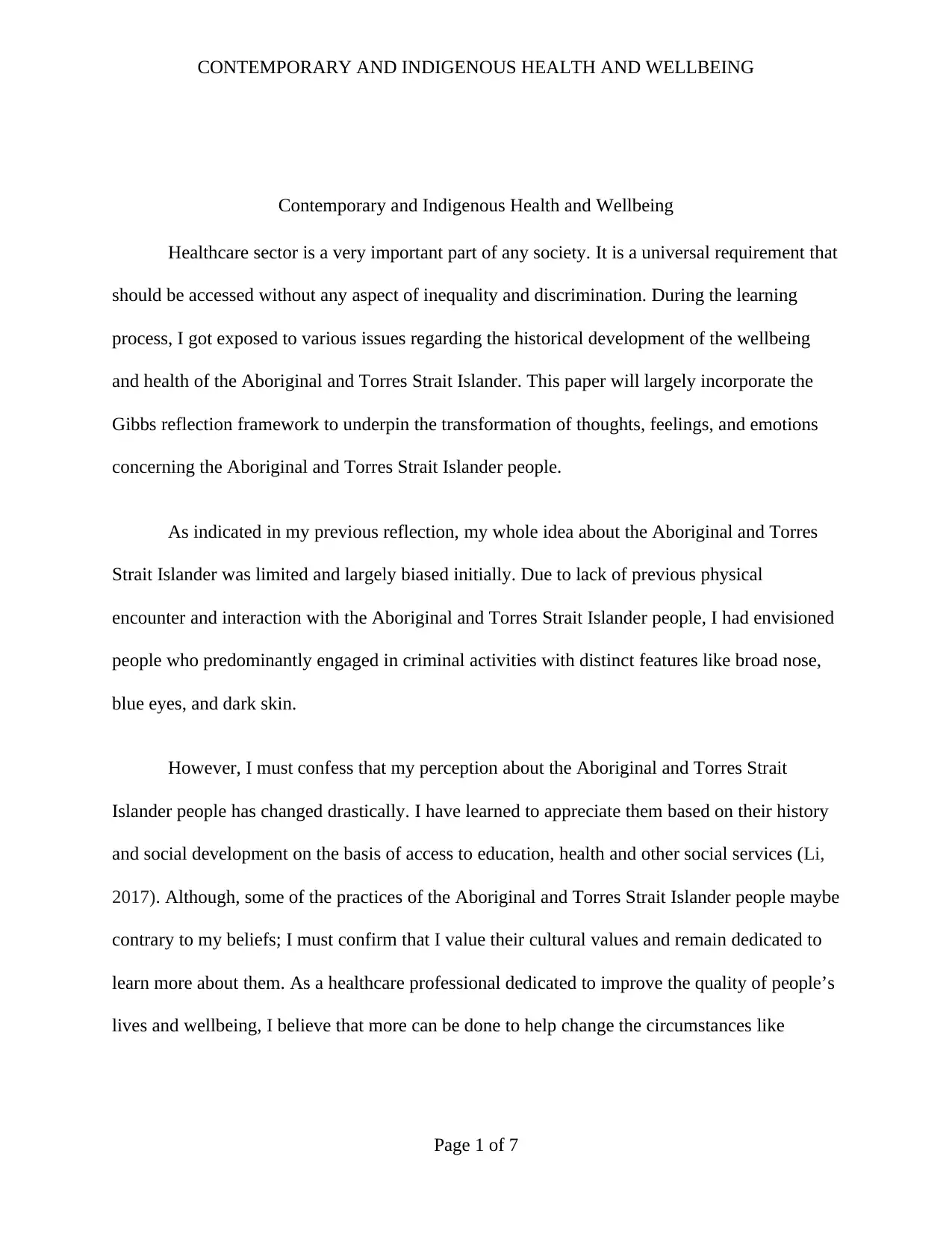
CONTEMPORARY AND INDIGENOUS HEALTH AND WELLBEING
Contemporary and Indigenous Health and Wellbeing
Healthcare sector is a very important part of any society. It is a universal requirement that
should be accessed without any aspect of inequality and discrimination. During the learning
process, I got exposed to various issues regarding the historical development of the wellbeing
and health of the Aboriginal and Torres Strait Islander. This paper will largely incorporate the
Gibbs reflection framework to underpin the transformation of thoughts, feelings, and emotions
concerning the Aboriginal and Torres Strait Islander people.
As indicated in my previous reflection, my whole idea about the Aboriginal and Torres
Strait Islander was limited and largely biased initially. Due to lack of previous physical
encounter and interaction with the Aboriginal and Torres Strait Islander people, I had envisioned
people who predominantly engaged in criminal activities with distinct features like broad nose,
blue eyes, and dark skin.
However, I must confess that my perception about the Aboriginal and Torres Strait
Islander people has changed drastically. I have learned to appreciate them based on their history
and social development on the basis of access to education, health and other social services (Li,
2017). Although, some of the practices of the Aboriginal and Torres Strait Islander people maybe
contrary to my beliefs; I must confirm that I value their cultural values and remain dedicated to
learn more about them. As a healthcare professional dedicated to improve the quality of people’s
lives and wellbeing, I believe that more can be done to help change the circumstances like
Page 1 of 7
Contemporary and Indigenous Health and Wellbeing
Healthcare sector is a very important part of any society. It is a universal requirement that
should be accessed without any aspect of inequality and discrimination. During the learning
process, I got exposed to various issues regarding the historical development of the wellbeing
and health of the Aboriginal and Torres Strait Islander. This paper will largely incorporate the
Gibbs reflection framework to underpin the transformation of thoughts, feelings, and emotions
concerning the Aboriginal and Torres Strait Islander people.
As indicated in my previous reflection, my whole idea about the Aboriginal and Torres
Strait Islander was limited and largely biased initially. Due to lack of previous physical
encounter and interaction with the Aboriginal and Torres Strait Islander people, I had envisioned
people who predominantly engaged in criminal activities with distinct features like broad nose,
blue eyes, and dark skin.
However, I must confess that my perception about the Aboriginal and Torres Strait
Islander people has changed drastically. I have learned to appreciate them based on their history
and social development on the basis of access to education, health and other social services (Li,
2017). Although, some of the practices of the Aboriginal and Torres Strait Islander people maybe
contrary to my beliefs; I must confirm that I value their cultural values and remain dedicated to
learn more about them. As a healthcare professional dedicated to improve the quality of people’s
lives and wellbeing, I believe that more can be done to help change the circumstances like
Page 1 of 7
Paraphrase This Document
Need a fresh take? Get an instant paraphrase of this document with our AI Paraphraser
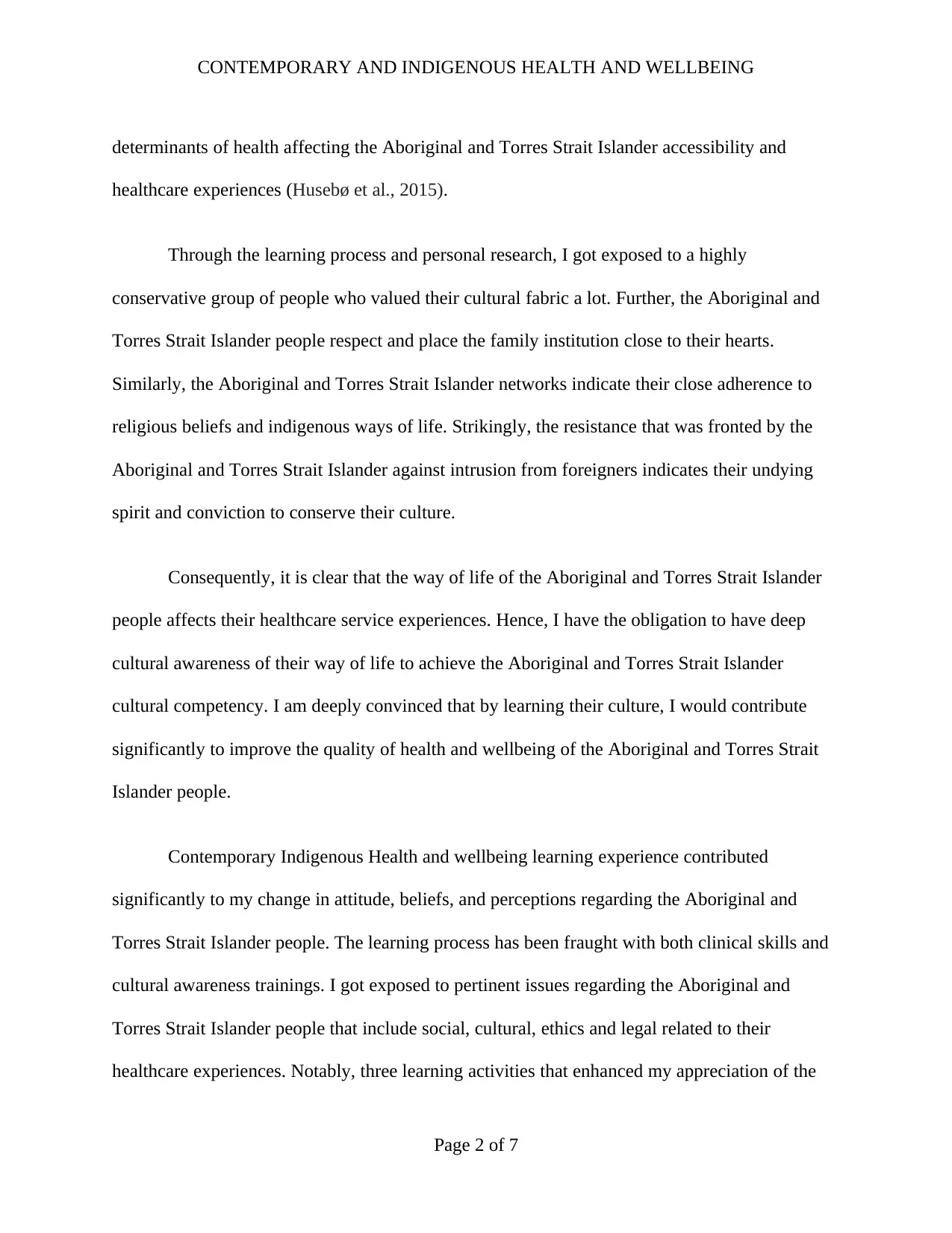
CONTEMPORARY AND INDIGENOUS HEALTH AND WELLBEING
determinants of health affecting the Aboriginal and Torres Strait Islander accessibility and
healthcare experiences (Husebø et al., 2015).
Through the learning process and personal research, I got exposed to a highly
conservative group of people who valued their cultural fabric a lot. Further, the Aboriginal and
Torres Strait Islander people respect and place the family institution close to their hearts.
Similarly, the Aboriginal and Torres Strait Islander networks indicate their close adherence to
religious beliefs and indigenous ways of life. Strikingly, the resistance that was fronted by the
Aboriginal and Torres Strait Islander against intrusion from foreigners indicates their undying
spirit and conviction to conserve their culture.
Consequently, it is clear that the way of life of the Aboriginal and Torres Strait Islander
people affects their healthcare service experiences. Hence, I have the obligation to have deep
cultural awareness of their way of life to achieve the Aboriginal and Torres Strait Islander
cultural competency. I am deeply convinced that by learning their culture, I would contribute
significantly to improve the quality of health and wellbeing of the Aboriginal and Torres Strait
Islander people.
Contemporary Indigenous Health and wellbeing learning experience contributed
significantly to my change in attitude, beliefs, and perceptions regarding the Aboriginal and
Torres Strait Islander people. The learning process has been fraught with both clinical skills and
cultural awareness trainings. I got exposed to pertinent issues regarding the Aboriginal and
Torres Strait Islander people that include social, cultural, ethics and legal related to their
healthcare experiences. Notably, three learning activities that enhanced my appreciation of the
Page 2 of 7
determinants of health affecting the Aboriginal and Torres Strait Islander accessibility and
healthcare experiences (Husebø et al., 2015).
Through the learning process and personal research, I got exposed to a highly
conservative group of people who valued their cultural fabric a lot. Further, the Aboriginal and
Torres Strait Islander people respect and place the family institution close to their hearts.
Similarly, the Aboriginal and Torres Strait Islander networks indicate their close adherence to
religious beliefs and indigenous ways of life. Strikingly, the resistance that was fronted by the
Aboriginal and Torres Strait Islander against intrusion from foreigners indicates their undying
spirit and conviction to conserve their culture.
Consequently, it is clear that the way of life of the Aboriginal and Torres Strait Islander
people affects their healthcare service experiences. Hence, I have the obligation to have deep
cultural awareness of their way of life to achieve the Aboriginal and Torres Strait Islander
cultural competency. I am deeply convinced that by learning their culture, I would contribute
significantly to improve the quality of health and wellbeing of the Aboriginal and Torres Strait
Islander people.
Contemporary Indigenous Health and wellbeing learning experience contributed
significantly to my change in attitude, beliefs, and perceptions regarding the Aboriginal and
Torres Strait Islander people. The learning process has been fraught with both clinical skills and
cultural awareness trainings. I got exposed to pertinent issues regarding the Aboriginal and
Torres Strait Islander people that include social, cultural, ethics and legal related to their
healthcare experiences. Notably, three learning activities that enhanced my appreciation of the
Page 2 of 7
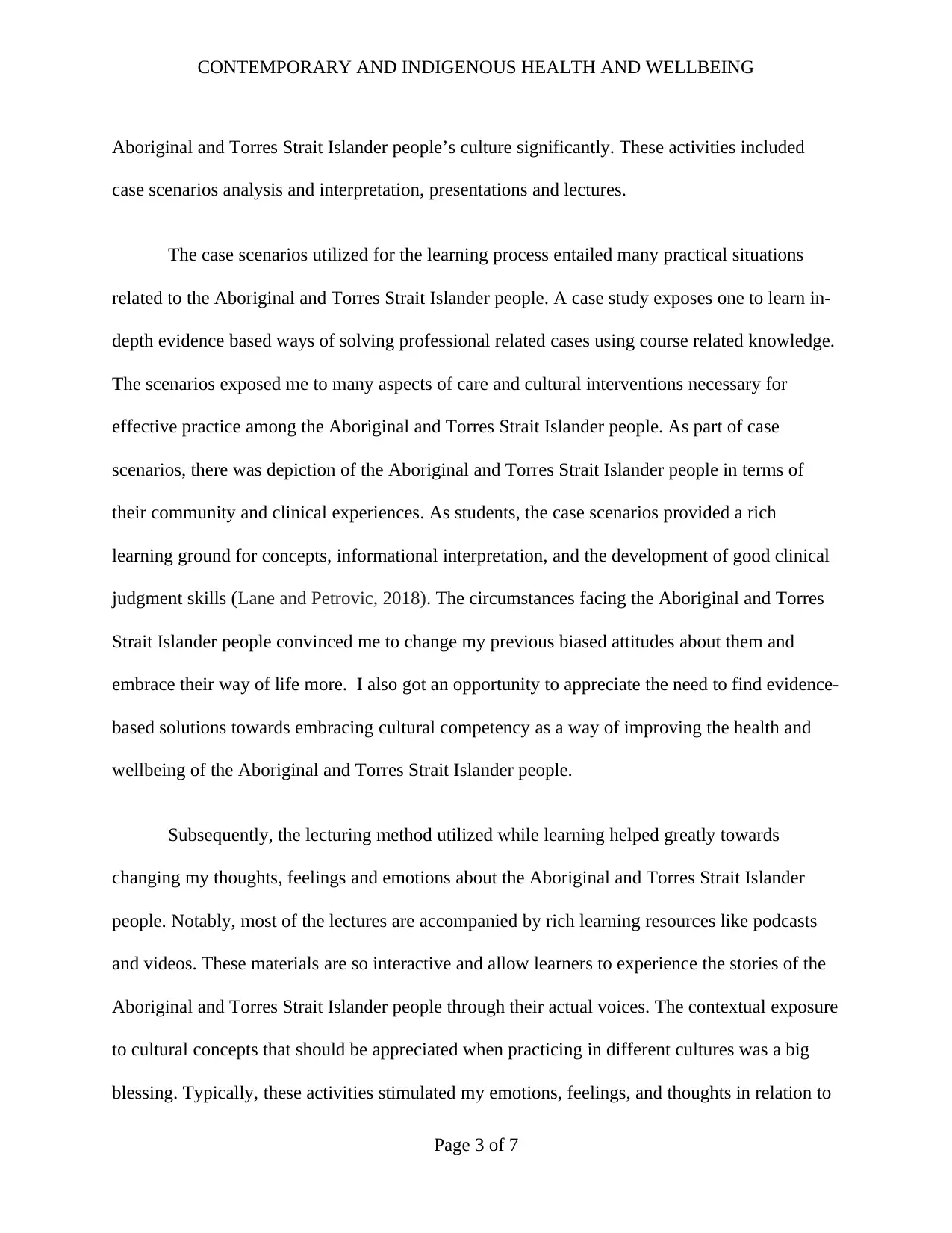
CONTEMPORARY AND INDIGENOUS HEALTH AND WELLBEING
Aboriginal and Torres Strait Islander people’s culture significantly. These activities included
case scenarios analysis and interpretation, presentations and lectures.
The case scenarios utilized for the learning process entailed many practical situations
related to the Aboriginal and Torres Strait Islander people. A case study exposes one to learn in-
depth evidence based ways of solving professional related cases using course related knowledge.
The scenarios exposed me to many aspects of care and cultural interventions necessary for
effective practice among the Aboriginal and Torres Strait Islander people. As part of case
scenarios, there was depiction of the Aboriginal and Torres Strait Islander people in terms of
their community and clinical experiences. As students, the case scenarios provided a rich
learning ground for concepts, informational interpretation, and the development of good clinical
judgment skills (Lane and Petrovic, 2018). The circumstances facing the Aboriginal and Torres
Strait Islander people convinced me to change my previous biased attitudes about them and
embrace their way of life more. I also got an opportunity to appreciate the need to find evidence-
based solutions towards embracing cultural competency as a way of improving the health and
wellbeing of the Aboriginal and Torres Strait Islander people.
Subsequently, the lecturing method utilized while learning helped greatly towards
changing my thoughts, feelings and emotions about the Aboriginal and Torres Strait Islander
people. Notably, most of the lectures are accompanied by rich learning resources like podcasts
and videos. These materials are so interactive and allow learners to experience the stories of the
Aboriginal and Torres Strait Islander people through their actual voices. The contextual exposure
to cultural concepts that should be appreciated when practicing in different cultures was a big
blessing. Typically, these activities stimulated my emotions, feelings, and thoughts in relation to
Page 3 of 7
Aboriginal and Torres Strait Islander people’s culture significantly. These activities included
case scenarios analysis and interpretation, presentations and lectures.
The case scenarios utilized for the learning process entailed many practical situations
related to the Aboriginal and Torres Strait Islander people. A case study exposes one to learn in-
depth evidence based ways of solving professional related cases using course related knowledge.
The scenarios exposed me to many aspects of care and cultural interventions necessary for
effective practice among the Aboriginal and Torres Strait Islander people. As part of case
scenarios, there was depiction of the Aboriginal and Torres Strait Islander people in terms of
their community and clinical experiences. As students, the case scenarios provided a rich
learning ground for concepts, informational interpretation, and the development of good clinical
judgment skills (Lane and Petrovic, 2018). The circumstances facing the Aboriginal and Torres
Strait Islander people convinced me to change my previous biased attitudes about them and
embrace their way of life more. I also got an opportunity to appreciate the need to find evidence-
based solutions towards embracing cultural competency as a way of improving the health and
wellbeing of the Aboriginal and Torres Strait Islander people.
Subsequently, the lecturing method utilized while learning helped greatly towards
changing my thoughts, feelings and emotions about the Aboriginal and Torres Strait Islander
people. Notably, most of the lectures are accompanied by rich learning resources like podcasts
and videos. These materials are so interactive and allow learners to experience the stories of the
Aboriginal and Torres Strait Islander people through their actual voices. The contextual exposure
to cultural concepts that should be appreciated when practicing in different cultures was a big
blessing. Typically, these activities stimulated my emotions, feelings, and thoughts in relation to
Page 3 of 7
⊘ This is a preview!⊘
Do you want full access?
Subscribe today to unlock all pages.

Trusted by 1+ million students worldwide
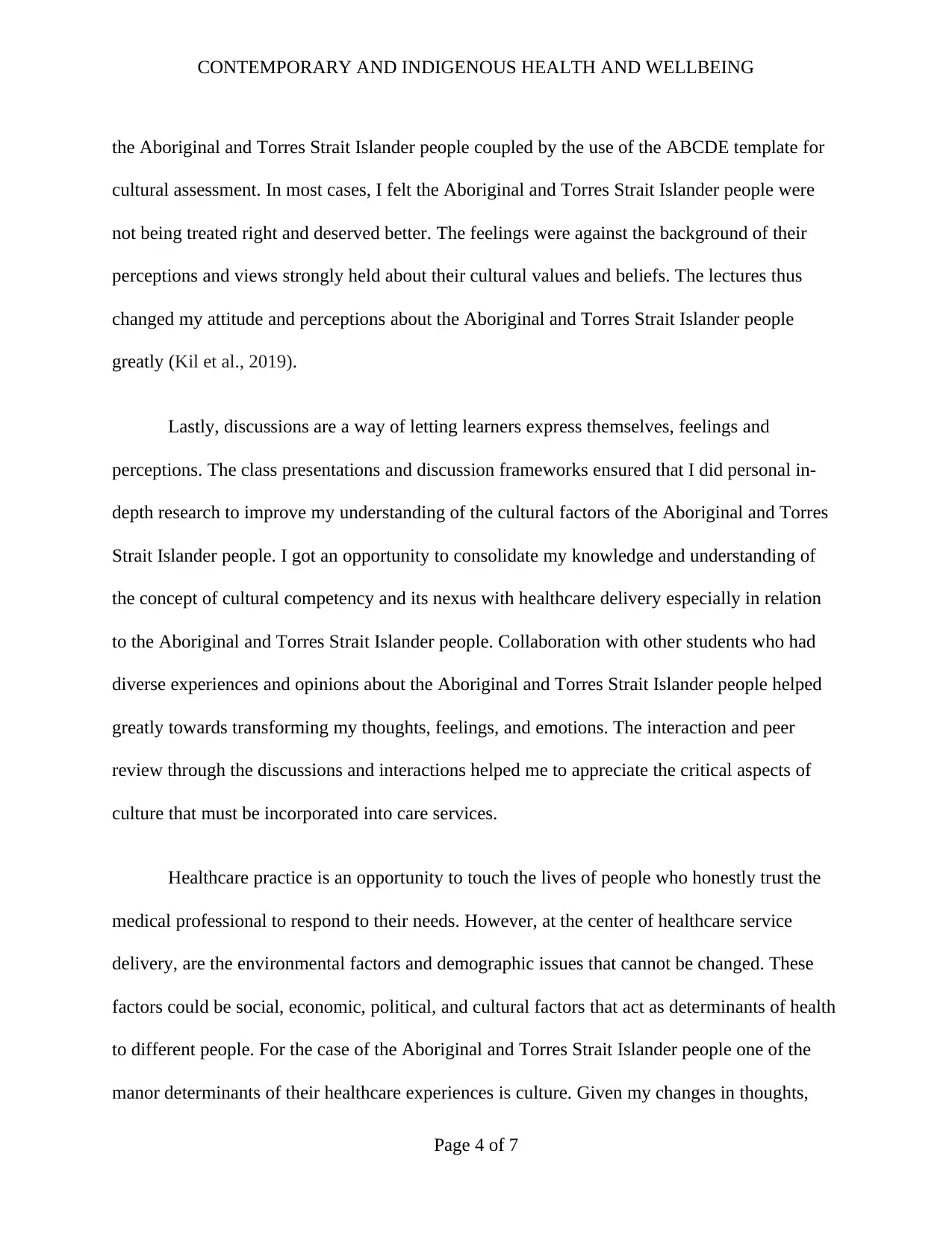
CONTEMPORARY AND INDIGENOUS HEALTH AND WELLBEING
the Aboriginal and Torres Strait Islander people coupled by the use of the ABCDE template for
cultural assessment. In most cases, I felt the Aboriginal and Torres Strait Islander people were
not being treated right and deserved better. The feelings were against the background of their
perceptions and views strongly held about their cultural values and beliefs. The lectures thus
changed my attitude and perceptions about the Aboriginal and Torres Strait Islander people
greatly (Kil et al., 2019).
Lastly, discussions are a way of letting learners express themselves, feelings and
perceptions. The class presentations and discussion frameworks ensured that I did personal in-
depth research to improve my understanding of the cultural factors of the Aboriginal and Torres
Strait Islander people. I got an opportunity to consolidate my knowledge and understanding of
the concept of cultural competency and its nexus with healthcare delivery especially in relation
to the Aboriginal and Torres Strait Islander people. Collaboration with other students who had
diverse experiences and opinions about the Aboriginal and Torres Strait Islander people helped
greatly towards transforming my thoughts, feelings, and emotions. The interaction and peer
review through the discussions and interactions helped me to appreciate the critical aspects of
culture that must be incorporated into care services.
Healthcare practice is an opportunity to touch the lives of people who honestly trust the
medical professional to respond to their needs. However, at the center of healthcare service
delivery, are the environmental factors and demographic issues that cannot be changed. These
factors could be social, economic, political, and cultural factors that act as determinants of health
to different people. For the case of the Aboriginal and Torres Strait Islander people one of the
manor determinants of their healthcare experiences is culture. Given my changes in thoughts,
Page 4 of 7
the Aboriginal and Torres Strait Islander people coupled by the use of the ABCDE template for
cultural assessment. In most cases, I felt the Aboriginal and Torres Strait Islander people were
not being treated right and deserved better. The feelings were against the background of their
perceptions and views strongly held about their cultural values and beliefs. The lectures thus
changed my attitude and perceptions about the Aboriginal and Torres Strait Islander people
greatly (Kil et al., 2019).
Lastly, discussions are a way of letting learners express themselves, feelings and
perceptions. The class presentations and discussion frameworks ensured that I did personal in-
depth research to improve my understanding of the cultural factors of the Aboriginal and Torres
Strait Islander people. I got an opportunity to consolidate my knowledge and understanding of
the concept of cultural competency and its nexus with healthcare delivery especially in relation
to the Aboriginal and Torres Strait Islander people. Collaboration with other students who had
diverse experiences and opinions about the Aboriginal and Torres Strait Islander people helped
greatly towards transforming my thoughts, feelings, and emotions. The interaction and peer
review through the discussions and interactions helped me to appreciate the critical aspects of
culture that must be incorporated into care services.
Healthcare practice is an opportunity to touch the lives of people who honestly trust the
medical professional to respond to their needs. However, at the center of healthcare service
delivery, are the environmental factors and demographic issues that cannot be changed. These
factors could be social, economic, political, and cultural factors that act as determinants of health
to different people. For the case of the Aboriginal and Torres Strait Islander people one of the
manor determinants of their healthcare experiences is culture. Given my changes in thoughts,
Page 4 of 7
Paraphrase This Document
Need a fresh take? Get an instant paraphrase of this document with our AI Paraphraser
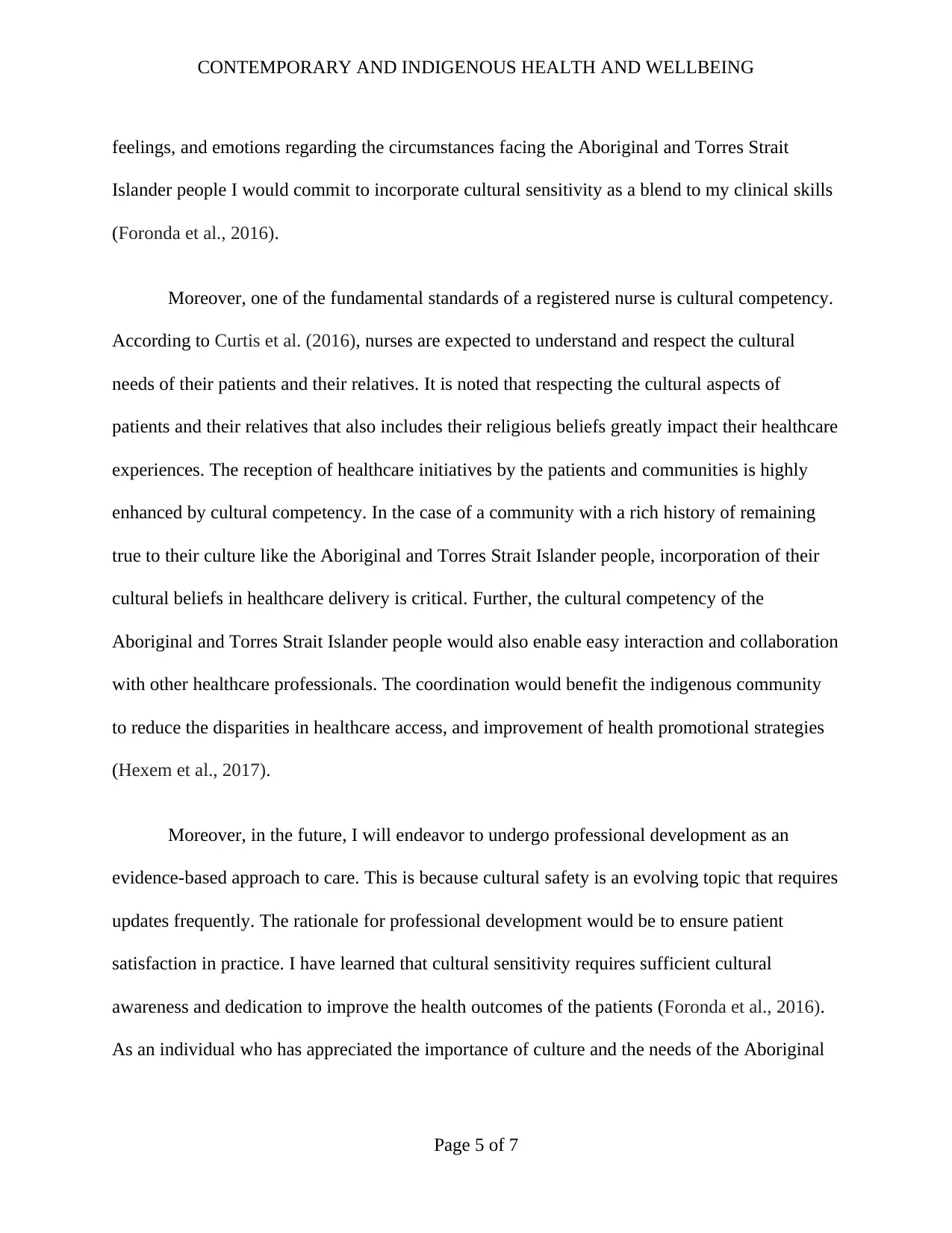
CONTEMPORARY AND INDIGENOUS HEALTH AND WELLBEING
feelings, and emotions regarding the circumstances facing the Aboriginal and Torres Strait
Islander people I would commit to incorporate cultural sensitivity as a blend to my clinical skills
(Foronda et al., 2016).
Moreover, one of the fundamental standards of a registered nurse is cultural competency.
According to Curtis et al. (2016), nurses are expected to understand and respect the cultural
needs of their patients and their relatives. It is noted that respecting the cultural aspects of
patients and their relatives that also includes their religious beliefs greatly impact their healthcare
experiences. The reception of healthcare initiatives by the patients and communities is highly
enhanced by cultural competency. In the case of a community with a rich history of remaining
true to their culture like the Aboriginal and Torres Strait Islander people, incorporation of their
cultural beliefs in healthcare delivery is critical. Further, the cultural competency of the
Aboriginal and Torres Strait Islander people would also enable easy interaction and collaboration
with other healthcare professionals. The coordination would benefit the indigenous community
to reduce the disparities in healthcare access, and improvement of health promotional strategies
(Hexem et al., 2017).
Moreover, in the future, I will endeavor to undergo professional development as an
evidence-based approach to care. This is because cultural safety is an evolving topic that requires
updates frequently. The rationale for professional development would be to ensure patient
satisfaction in practice. I have learned that cultural sensitivity requires sufficient cultural
awareness and dedication to improve the health outcomes of the patients (Foronda et al., 2016).
As an individual who has appreciated the importance of culture and the needs of the Aboriginal
Page 5 of 7
feelings, and emotions regarding the circumstances facing the Aboriginal and Torres Strait
Islander people I would commit to incorporate cultural sensitivity as a blend to my clinical skills
(Foronda et al., 2016).
Moreover, one of the fundamental standards of a registered nurse is cultural competency.
According to Curtis et al. (2016), nurses are expected to understand and respect the cultural
needs of their patients and their relatives. It is noted that respecting the cultural aspects of
patients and their relatives that also includes their religious beliefs greatly impact their healthcare
experiences. The reception of healthcare initiatives by the patients and communities is highly
enhanced by cultural competency. In the case of a community with a rich history of remaining
true to their culture like the Aboriginal and Torres Strait Islander people, incorporation of their
cultural beliefs in healthcare delivery is critical. Further, the cultural competency of the
Aboriginal and Torres Strait Islander people would also enable easy interaction and collaboration
with other healthcare professionals. The coordination would benefit the indigenous community
to reduce the disparities in healthcare access, and improvement of health promotional strategies
(Hexem et al., 2017).
Moreover, in the future, I will endeavor to undergo professional development as an
evidence-based approach to care. This is because cultural safety is an evolving topic that requires
updates frequently. The rationale for professional development would be to ensure patient
satisfaction in practice. I have learned that cultural sensitivity requires sufficient cultural
awareness and dedication to improve the health outcomes of the patients (Foronda et al., 2016).
As an individual who has appreciated the importance of culture and the needs of the Aboriginal
Page 5 of 7
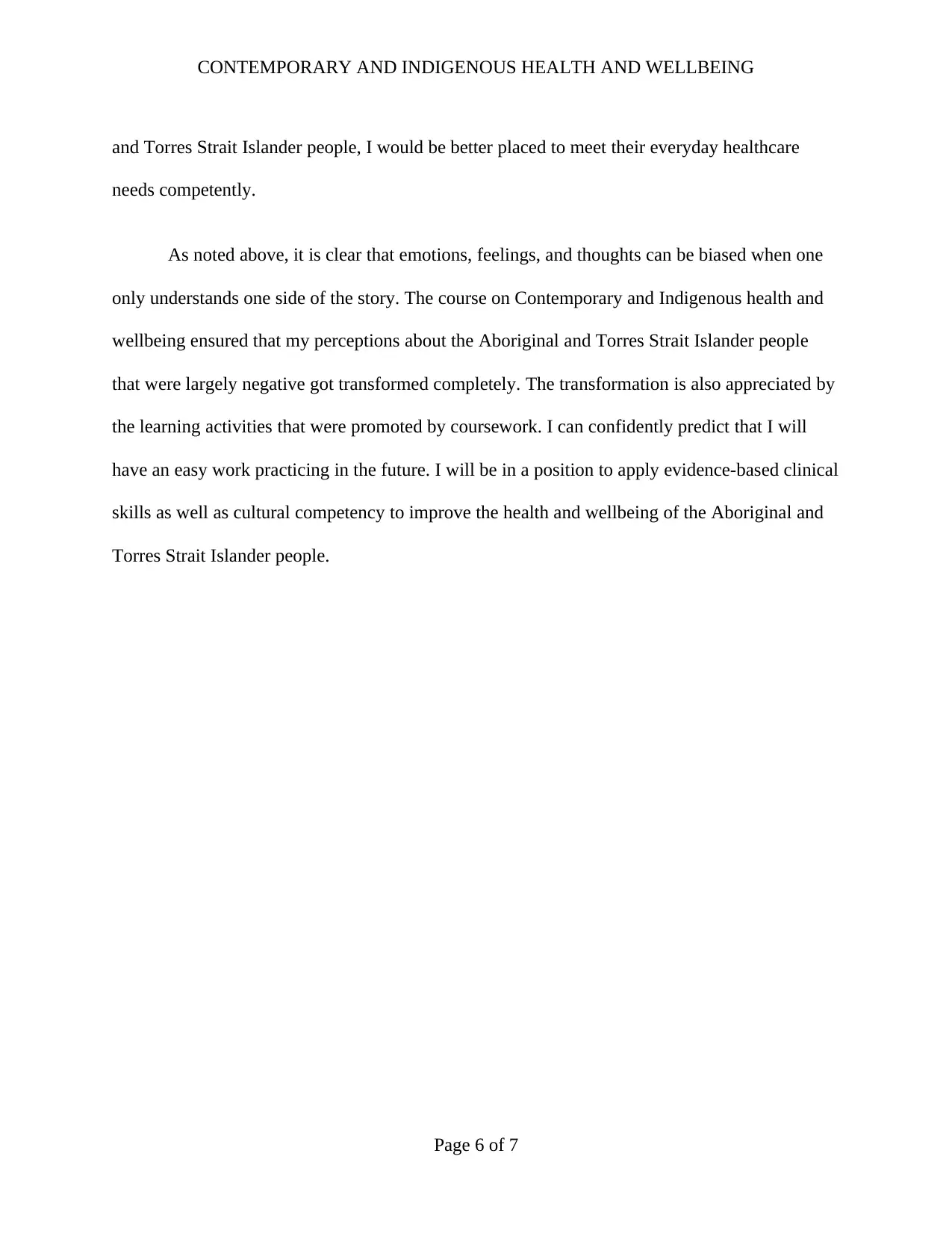
CONTEMPORARY AND INDIGENOUS HEALTH AND WELLBEING
and Torres Strait Islander people, I would be better placed to meet their everyday healthcare
needs competently.
As noted above, it is clear that emotions, feelings, and thoughts can be biased when one
only understands one side of the story. The course on Contemporary and Indigenous health and
wellbeing ensured that my perceptions about the Aboriginal and Torres Strait Islander people
that were largely negative got transformed completely. The transformation is also appreciated by
the learning activities that were promoted by coursework. I can confidently predict that I will
have an easy work practicing in the future. I will be in a position to apply evidence-based clinical
skills as well as cultural competency to improve the health and wellbeing of the Aboriginal and
Torres Strait Islander people.
Page 6 of 7
and Torres Strait Islander people, I would be better placed to meet their everyday healthcare
needs competently.
As noted above, it is clear that emotions, feelings, and thoughts can be biased when one
only understands one side of the story. The course on Contemporary and Indigenous health and
wellbeing ensured that my perceptions about the Aboriginal and Torres Strait Islander people
that were largely negative got transformed completely. The transformation is also appreciated by
the learning activities that were promoted by coursework. I can confidently predict that I will
have an easy work practicing in the future. I will be in a position to apply evidence-based clinical
skills as well as cultural competency to improve the health and wellbeing of the Aboriginal and
Torres Strait Islander people.
Page 6 of 7
⊘ This is a preview!⊘
Do you want full access?
Subscribe today to unlock all pages.

Trusted by 1+ million students worldwide
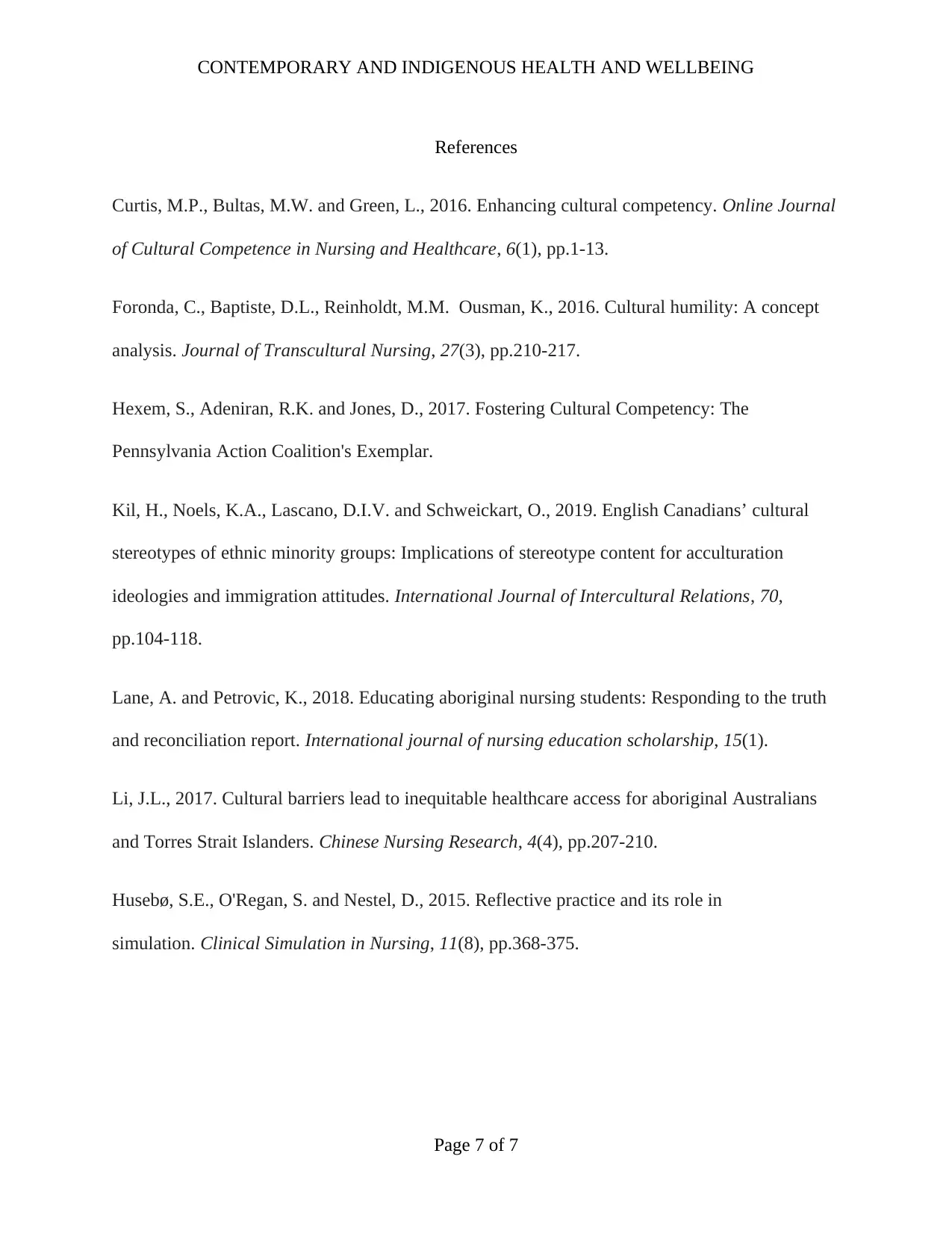
CONTEMPORARY AND INDIGENOUS HEALTH AND WELLBEING
References
Curtis, M.P., Bultas, M.W. and Green, L., 2016. Enhancing cultural competency. Online Journal
of Cultural Competence in Nursing and Healthcare, 6(1), pp.1-13.
Foronda, C., Baptiste, D.L., Reinholdt, M.M. Ousman, K., 2016. Cultural humility: A concept
analysis. Journal of Transcultural Nursing, 27(3), pp.210-217.
Hexem, S., Adeniran, R.K. and Jones, D., 2017. Fostering Cultural Competency: The
Pennsylvania Action Coalition's Exemplar.
Kil, H., Noels, K.A., Lascano, D.I.V. and Schweickart, O., 2019. English Canadians’ cultural
stereotypes of ethnic minority groups: Implications of stereotype content for acculturation
ideologies and immigration attitudes. International Journal of Intercultural Relations, 70,
pp.104-118.
Lane, A. and Petrovic, K., 2018. Educating aboriginal nursing students: Responding to the truth
and reconciliation report. International journal of nursing education scholarship, 15(1).
Li, J.L., 2017. Cultural barriers lead to inequitable healthcare access for aboriginal Australians
and Torres Strait Islanders. Chinese Nursing Research, 4(4), pp.207-210.
Husebø, S.E., O'Regan, S. and Nestel, D., 2015. Reflective practice and its role in
simulation. Clinical Simulation in Nursing, 11(8), pp.368-375.
Page 7 of 7
References
Curtis, M.P., Bultas, M.W. and Green, L., 2016. Enhancing cultural competency. Online Journal
of Cultural Competence in Nursing and Healthcare, 6(1), pp.1-13.
Foronda, C., Baptiste, D.L., Reinholdt, M.M. Ousman, K., 2016. Cultural humility: A concept
analysis. Journal of Transcultural Nursing, 27(3), pp.210-217.
Hexem, S., Adeniran, R.K. and Jones, D., 2017. Fostering Cultural Competency: The
Pennsylvania Action Coalition's Exemplar.
Kil, H., Noels, K.A., Lascano, D.I.V. and Schweickart, O., 2019. English Canadians’ cultural
stereotypes of ethnic minority groups: Implications of stereotype content for acculturation
ideologies and immigration attitudes. International Journal of Intercultural Relations, 70,
pp.104-118.
Lane, A. and Petrovic, K., 2018. Educating aboriginal nursing students: Responding to the truth
and reconciliation report. International journal of nursing education scholarship, 15(1).
Li, J.L., 2017. Cultural barriers lead to inequitable healthcare access for aboriginal Australians
and Torres Strait Islanders. Chinese Nursing Research, 4(4), pp.207-210.
Husebø, S.E., O'Regan, S. and Nestel, D., 2015. Reflective practice and its role in
simulation. Clinical Simulation in Nursing, 11(8), pp.368-375.
Page 7 of 7
1 out of 7
Related Documents
Your All-in-One AI-Powered Toolkit for Academic Success.
+13062052269
info@desklib.com
Available 24*7 on WhatsApp / Email
![[object Object]](/_next/static/media/star-bottom.7253800d.svg)
Unlock your academic potential
Copyright © 2020–2026 A2Z Services. All Rights Reserved. Developed and managed by ZUCOL.





